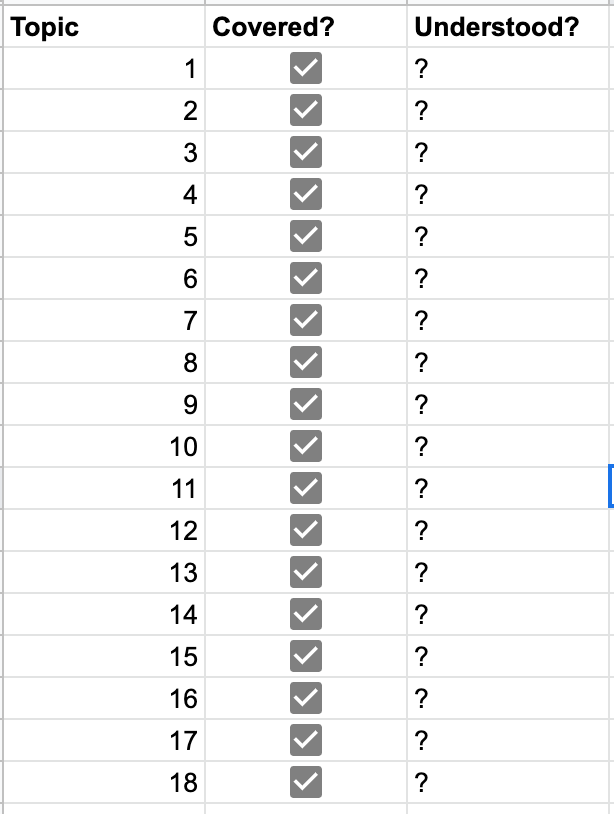Topic checklist and tickboxes by Terry Freedman
In the film Bridge on the River Kwai, Alec Guinness plays the part of a Colonel Nicholson in a Japanese prisoner of war camp. Nicholson oversees the construction of the bridge by the men under his command, and becomes so obsessed with making sure that it's built properly that he forgets that he is actually going to be helping the enemy by doing so. Apparently, this is not how it was in real life, but the film plot does serve to illustrate something that we're probably all familiar with, namely that it's very easy to lose sight of why you're doing what you're doing.
I've come across several examples of this in my visits to schools. In one case, it was quite obvious by the end of the lesson that very few, if any, of the students had understood what had been "taught", which was the concept of modelling. When I pointed this out to the teacher, and asked him if he intended to cover it again, he replied that there was no time for that as he had to get through the syllabus.
I've come across this on several occasions: there is so much pressure to cover so many things, that teachers, and even whole teams, sometimes lose sight of the fact that the whole point of children attending school is in order to learn something. If, by the end of a lesson, the students are none the wiser about the topic in hand, all that's been achieved is that the teacher can tick off the topic in the scheme of work. But no learning or achievement has taken place.
I've heard a similar argument put forward for not spending time on assessment for learning techniques or devoting time to plenary sessions in a lesson. It's imperative, I think, that everyone involved in the teaching of Computing in schools has the courage to state that, whilst there is a body of knowledge that needs to be covered, and whilst there is a need for pace in lessons, the most basic need is for students to learn, and if that doesn't happen then all we have is a tick-boxing exercise!
Another example I came across was when I visited a school to discuss the implementation of the FITS (Framework for ICT Support) process. The technician, a very intelligent and dedicated person, was feeling very pleased with herself because she had started to implement an incident management process, by logging all the incidents that occurred. She is currently doing this by writing out the details on templates she has designed for the purpose. I asked why she didn't enter them onto a database or spreadsheet, and she said that she doesn't have time.
Now, a key purpose of incident management is to be able to keep track of how many times a particular incident occurs, because that way you can start to make a judgement about whether there is a more fundamental underlying problem that needs to be addressed. Unfortunately, a handwritten incident log simply does not lend itself to that type of use. In other words, there is pretty much no point in compiling the incident log at all. After all, the only point of any database is to be able to get information out of it. If that is too difficult or time-consuming, you might as well get rid of it.
Interestingly enough, when I put all this to the technician concerned, she admitted that at the end of last year she had a whole ring binder-full of these incident sheets, and she threw the whole lot away, because there was no way she was ever going to look at them.
As someone in another school I visited in connection with the implementation of FITS said: if you implement a help desk that doesn't help anyone, you don't actually have a help desk. And if you implement an incident management system that doesn't help you manage incidents and doesn't alert you to underlying issues, you don't actually have an incident management system.
Ultimately, the whole point of FITS, as of everything else that goes on in schools, is to facilitate children's learning and achievement. So, if a problem isn't resolved because nobody has picked up the fact that there is a problem, there's a chance that people's education will be disrupted from time to time.
So what is the answer? My recommendation would be for everyone involved in all aspects of education (not even just Computing), to have a sign where they can see it everyday which has just two words on it: "So what?". This is, in effect, what the Ofsted inspections system is based on, and it is, to say the least, a very powerful question. It doesn't matter what you've done, are doing, or intend to do: if it doesn't have an impact on children's learning, or at the very least answer the question that the activity was designed to address in the first place, then it's pointless.
If you found this article interesting and useful, why not subscribe to my newsletter, Digital Education? It’s been going since the year 2000, and has news, views and reviews for Computing and ed tech teachers — and useful tips.

